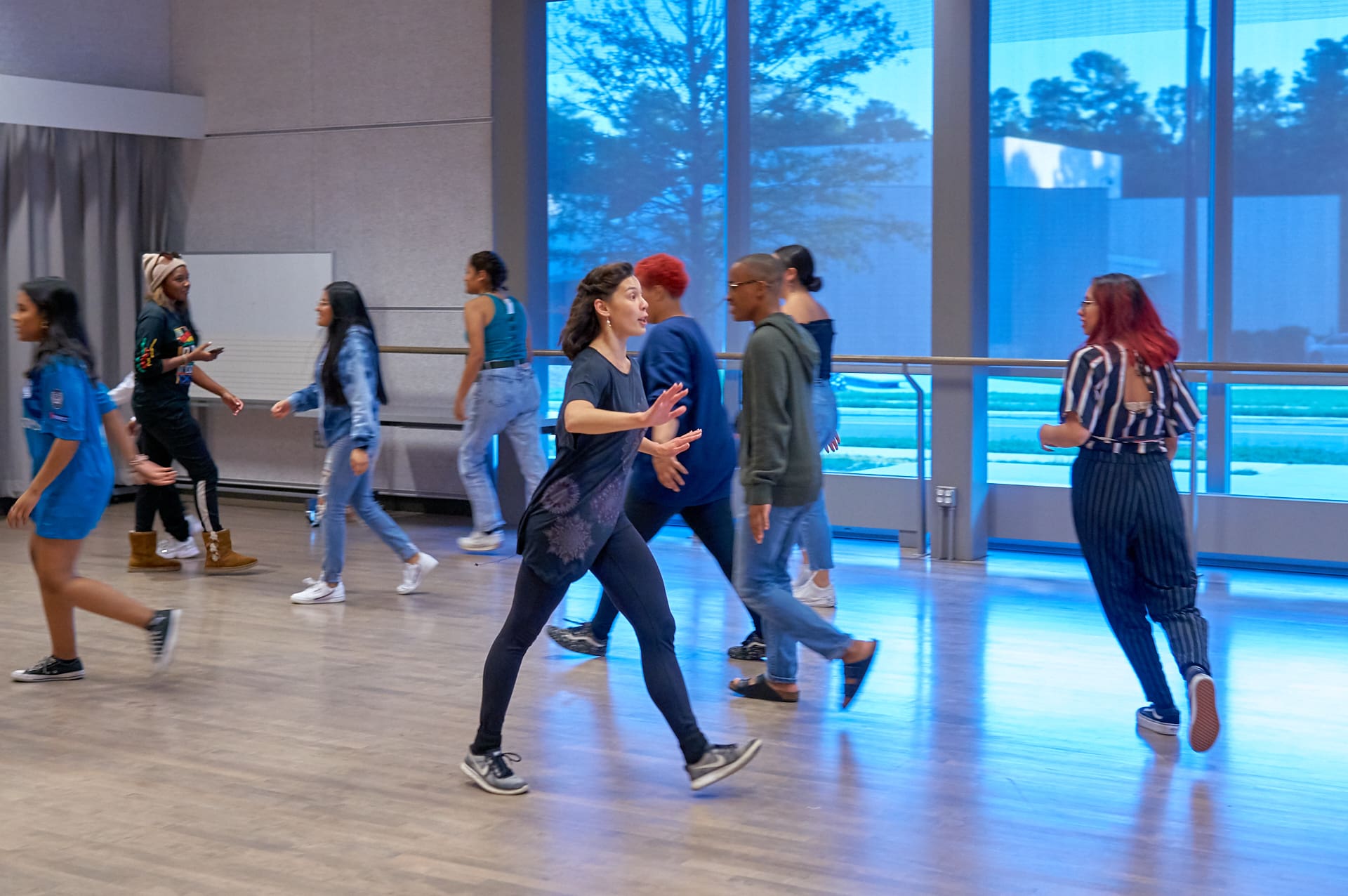
This is part of a series commemorating the inaugural cohort of Duke’s MFA in Dance. Learn more about the program and its 2021 graduates here.
Courtney Liu’s thesis, “Body Image, Ballet Pedagogy, & Flow/Yu: Pedagogical Recommendations to Mitigate Self-Objectification and Choreographic Processes to Move Towards Embodied Flow States,” brings relevant psychological and pedagogical literature into a toolkit for ballet educators with an aim to reduce self-objectification in classrooms. Courtney’s arguments draw on objectification theory, which describes the altered psychological state where individuals begin to view themselves as a body or sum of body parts.
Dance scholars have critiqued the thin ideal in ballet, professional dancers have published autobiographical accounts documenting their physical and psychological suffering, and popular films and television shows have made the connection between eating disorders and ballet infamous. Building on many years of research that has identified self-objectification and related eating and body image disturbances as a problem in ballet, Courtney’s research applies, expands upon and offers progressive pedagogical approaches to reduce self-objectification in the ballet classroom.
In her thesis, Courtney perceives flow states as the next frontier of research in this area; her pedagogical recommendations facilitate a collaborative choreographic process that investigates the potential of dancing flow states to help buffer dancers against self-objectification and to amplify embodied audience engagement as well.
—Prof. Purnima Shah, Primary Advisor

Progressive ballet pedagogy and choreographic inquiry are the two distinct and intertwining branches that have shaped Courtney’s MFA research at Duke. Building on a foundation of progressive, feminist and critical pedagogy, her final written work brings progressive ballet pedagogy in conversation with eating and body image disturbances under the framework of objectification theory.
The resulting “toolkit” for ballet teachers is informed by relevant literature in pedagogy and psychology, as well as Liu’s own experience of applying and expanding the proposed approaches. To conclude, Courtney suggests the intentional cultivation of flow states in the classroom as a possible antidote to objectification and a ripe area for research.
In addition to informing her own teaching, methods from the toolkit (vivid imagery, somatic approaches, three-dimensional language, prompts for imagining the future of ballet, diversifying curricular content, sensitive approaches to the environment/others) have also inspired Courtney’s choreographic works during the MFA. Accordingly, the choreographic branch of her research culminates in a live-streamed performance that explores the nature, cultivation and cross-cultural aspects of flow and yu states.
Thesis Advisory Committee: Prof. Purnima Shah, Michael Kliën, Tyler Walters, Katya Wesolowski
Reflecting the intersecting dual tracks in pedagogy and choreography that have shaped Courtney’s MFA research, the final outward facing project unfolds in two parts.
The first program, a live-streamed proscenium performance featuring ten undergraduate dancers and interactive projections by Mingyong Cheng (MFA EDA ‘21), was dedicated to the exploration and cultivation of engaged artistic flow/yu states in the studio and onstage. Courtney and the students investigated various facilitators, inhibitors and characteristics of flow/yu, including intention, curiosity, bliss, distraction, collective engagement, joy, peace and suspension of time. The title, “Waters to Waters: Between Yu and Flow,” reflects the combination of eastern and western practices that informed the final work.
In the second program, a live-streamed Artists in Conversation presentation through Duke Arts, Courtney presented progressive pedagogical advances that have the potential to reduce self- and other-objectification in the dance classroom. Segments of choreography inspired by these pedagogical tools were woven throughout the presentation as Courtney shared how interdisciplinary research in pedagogy and choreographic inquiry worked in tandem to uncover unexpected revelations.

Courtney Kristen Liu is a choreographer, teaching artist and performer who is currently pursuing an MFA and teaching courses and workshops at Duke University. She has taught dance for 15-plus years (university, private studio, community settings), and her pedagogical research has been presented at the Embodied Learning Summit and the National Dance Educators Organization.
Courtney has choreographed a variety of dance performances/films, and her collaborative work was recently commissioned by the American Dance Festival and the Nasher Museum of Art for Carrie Mae Weems’ RESIST COVID / TAKE 6! exhibit. Performance credits include Matthew Bourne’s Swan Lake, The Phantom of the Opera (Broadway cast), the Radio City Christmas Spectacular, Peridance Contemporary Dance Company, and the Cincinnati Ballet. Courtney has served as Assistant Dance Captain at The Phantom of the Opera and as Assistant Director for Norwegian Cruise Lines. She is an RYT-200 certified yoga instructor and ABT Certified Teacher in levels Pre-Primary through Level 3.
“The soul was never put in the body to stand still.” —John Webster

